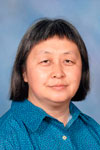Computational Biology Certificate Program
The IGBB is pleased to be a supporter of MS State's Computational Biology Certificate Program. This program allows undergraduate and graduate students in the computational and life sciences to pursue a well-defined program where they gain fundamental skills in computing and biology so that they will be competitive for high-end employment in emerging technical fields. Students learn how to apply computational techniques to understand structures, functions, dynamics, and evolution of living organisms. The certificate program is ideal for students working towards (or possessing) a B.S. or M.S. degree in computer science, computer engineering, mathematics, statistics, biological engineering, or one of the life sciences. A computational biology certificate will be issued jointly by the Bagley College of Engineering and the College of Agriculture & Life Sciences upon a candidate's successful completion of the requirements of the program. Completion of the certificate program will be indicated on the student’s transcript. This program requires that the student complete a total of five courses that have been approved by the Computational Biology Advisory Board.
- All students must complete the capstone course, CSE 4623/CSE 6623 Computational Biology.
- Students in the life sciences must also complete CSE 4613/6613 Bio-computing.
- Students in computer science, computer engineering, and biological engineering must complete BCH 4113/BCH 6113 Essentials of Molecular Genetics.
- Students must complete at least three additional relevant courses (for a minimum of nine hours) chosen from computational or life sciences fields. The courses in the list below are all acceptable. In addition, many relevant courses are often taught as special topics courses in a variety of departments. A student must obtain approval for all special topics courses before enrolling.
Up to three hours of appropriate Directed Individual Study may be applied toward the degree. The student should supply a synopsis of the individual study course. At least 4 of the 5 courses including the capstone course CSE 4623/6623 must be completed at MS State. Only undergraduate courses completed with a grade of C or better or graduate courses completed with a grade of B or better are acceptable.
Life Sciences Courses:
BCH 4414/6414 Protein Methods
BCH 4713/6713 Molecular Biology
BCH 4804/6804 Molecular Biology Methods
BCH 4990/6990 Special Topics in Biochemistry and Molecular Biology (when appropriate)
BCH 8243 Molecular Biology of Plants
BCH/PSS 8653 Genomes and Genomics
BCH 8633 Enzymes
BCH 8643 Molecular Genetics
BCH 8990 Special Topics in Biochemistry and Molecular Biology
BIO 4133/6133 Human Genetics
BIO 4990/6990 Special Topics
BIO 4113/6113 Evolutionary Biology
BIO 4442/6442 Bacterial Genetics Lab
BIO 4443/6443 Bacterial Genetics
BIO 8990 Special Topics in Biology (when appropriate)
Plus other courses from Entomology and Plant Pathology, Forestry, Plant and Soil Sciences, Poultry Sciences, Veterinary Medicine
Computational Courses:
CSE 4253/6253 Designing Parallel Algorithms
CSE 4283/6283 Principles of Computer Graphics
CSE 4504/6504 Database Management Systems
CSE 4633/6633 Artificial Intelligence
CSE 4833/6833 Introduction to Analysis of Algorithms
CSE 4990/6990 Special Topics in Computer Science
CSE 8163 Parallel and Distributed Scientific Computing
CSE 8413 Visualization
CSE 8543 Advanced Topics in Database Design
CSE 8663 Neural Computing
CSE 8673 Machine Learning
CSE 8833 Algorithms
CSE 8843 Complexity of Sequential and Parallel Algorithms
CSE 8990 Special Topics in Computer Science (when appropriate)
Statistics Courses:
One course in statistics such as ST 8114 can be applied towards the certificate.
Example Special Topics Courses:
The following courses are examples of special topics courses taught recently that would be appropriate.
PSS/BCH 8631 Topics in Genomics (Dan Peterson)
ADS 8990 Current Topics in Animal Cell and Molecular Biology (Erdogan Memili)
CSE 8990 Algorithms for Bioinformatics (Eric Hansen)
Illustrative Programs of Study:
Illustrative program of study for a student in the life sciences
CSE 4613/66133 Bio-computing
CSE 4623/CSE 6623 Computational Biology.
BCH 8643 Molecular Genetics
BIO 4133/6133 Human Genetics
BCH 4804/6804 Molecular Biology Methods
Illustrative program of study for a student in computer science
BCH 4113/BCH 6113 Essentials of Molecular Genetics
CSE 4623/CSE 6623 Computational Biology
CSE 4253/6253 Designing Parallel Algorithms
CSE 4283/6283 Principles of Computer Graphics
CSE 4504/6504 Database Management Systems
Computational Biology Advisory Board:
Chair
Dr. Andy Perkins - Computer Science & Engineering
Board Members
Dr. Brian A. Counterman - Biological Sciences
Dr. Bindu Nanduri - CVM Basic Sciences
Dr. Zhaohua Peng - Biochemistry, Molecular Biology, Entomology & Plant Pathology
Dr. Daniel G. Peterson - IGBB and Plant & Soil Sciences
Dr. Lauren Priddy - Agricultural & Biological Engineering




Associate Research Professor
Biochemistry, Molecular Biology, Entomology & Plant Pathology
IGBB Affiliate
(662) 325-2640
The IGBB is supported, in part, by the following units:
The IGBB is an HPC² member center.









